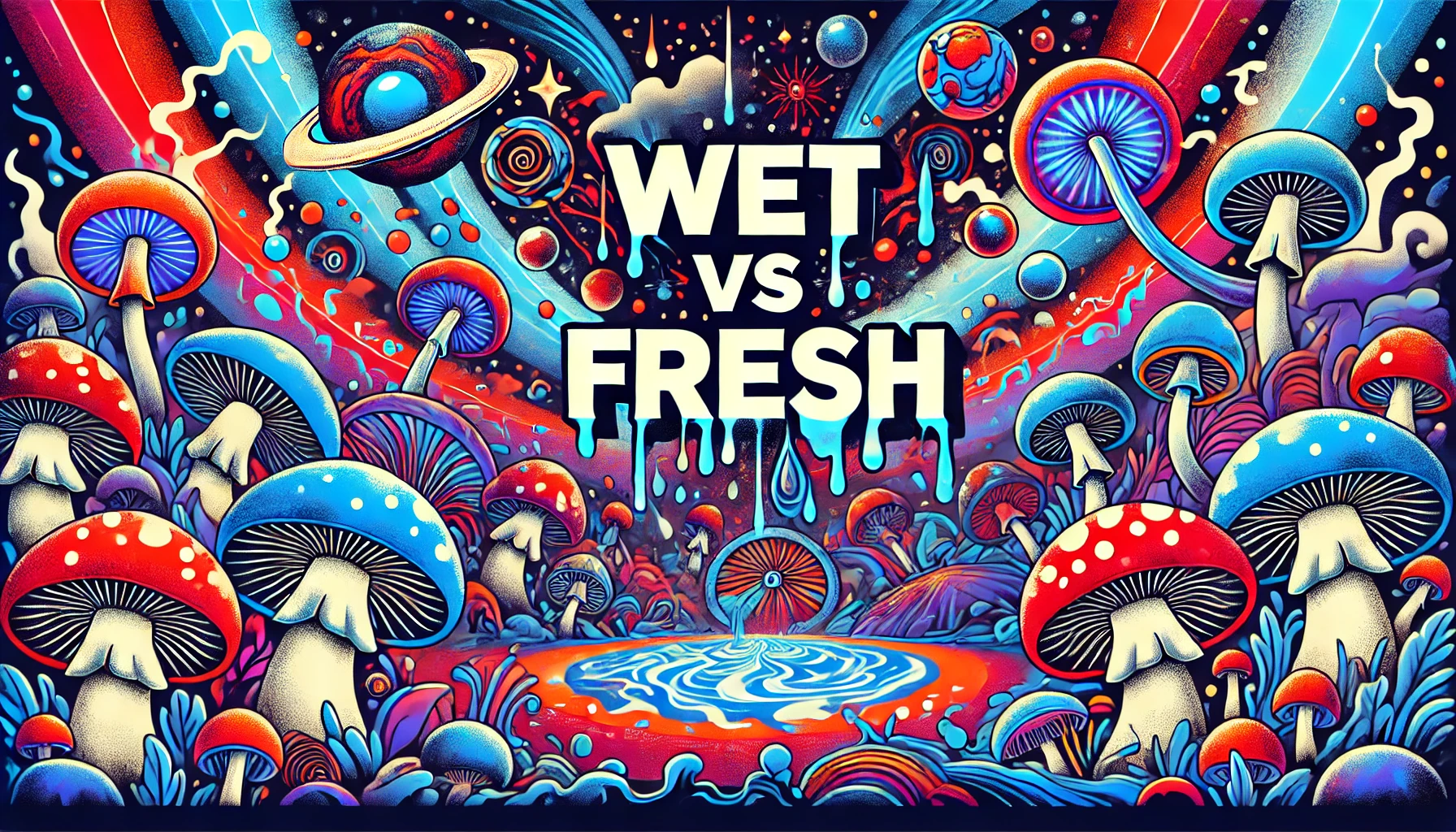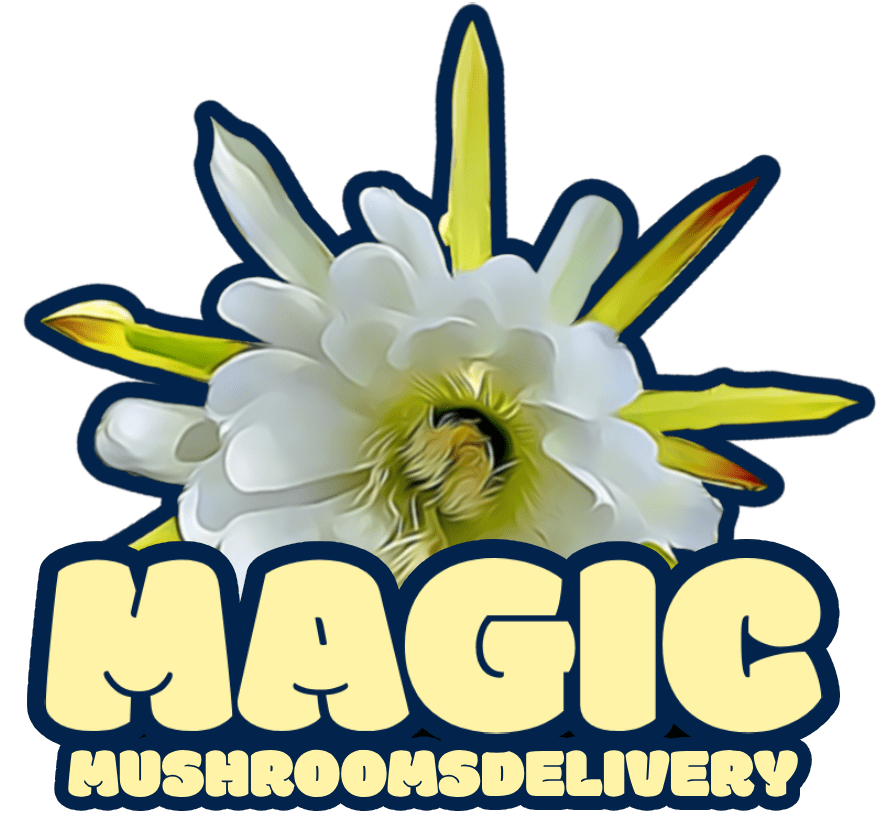

Fresh vs. Dry Mushrooms: Potency and Effects Showdown
Magic mushrooms have captivated the minds of psychonauts and curious individuals for centuries. But when it comes to consuming these mystical fungi, a question often arises: fresh or dried? When we say fresh, we’re referring to wet mushrooms. It seems each form boasts its own unique set of characteristics and effects. According to a 2017 Global Drug Survey, magic mushrooms were rated as the safest recreational drug, with only 0.2% of users seeking emergency medical treatment. But does the form you consume affect your trip? Let’s embark on a mind-bending journey through the world of psilocybin mushrooms and explore the fresh vs. dry showdown!
Before we compare wet vs fresh mushrooms, here’s some of the main take aways:
- Potency: Fresh mushrooms contain more psilocin, while dried mushrooms have a higher concentration of psilocybin.
- Onset and Duration: Fresh mushrooms tend to kick in faster but have a shorter duration compared to dried ones.
- Storage: Dried mushrooms have a significantly longer shelf life and are easier to store.
- Experience: Some users report a more “earthy” and intense experience with fresh mushrooms.
- Dosage: Dried mushrooms are easier to measure and dose accurately.
Wet vs Dried Shrooms
To truly understand the fresh vs. dry debate, we need to dive into the chemistry of these fascinating fungi. The main psychoactive compounds in magic mushrooms are psilocybin and psilocin.
- Psilocybin is actually a prodrug, meaning it’s not active until it’s metabolized by the body. Once ingested, it’s converted into psilocin, which is the compound responsible for the psychedelic effects.
- Psilocin works its magic by binding to serotonin receptors in the brain, particularly the 5-HT2A receptor. This interaction leads to altered perception, mood changes, and the characteristic “trip” associated with magic mushrooms. But these two compounds aren’t the only players in the game. Mushrooms also contain other active compounds like baeocystin and norbaeocystin, which may contribute to the overall experience in ways we’re still uncovering.
Fresh Mushrooms: Nature’s Psychedelic Bounty
Fresh magic mushrooms are like nature’s own little psychedelic packages. They’re typically soft, spongy, and contain a high water content – up to 90% in some cases. This moisture is crucial to understanding their potency and effects.
When it comes to potency, fresh mushrooms have a secret weapon: they contain more psilocin. Remember, psilocin is the compound that directly causes psychedelic effects. In fresh mushrooms, a significant portion of the active compounds exist as psilocin, ready to be absorbed by your body without needing conversion.
However, fresh mushrooms come with a catch – they don’t last long. Their high water content makes them susceptible to rapid degradation. If not consumed quickly or properly stored, they can lose potency or even spoil within a few days.
The Fresh Mushroom Experience
Many psychonauts swear by the fresh mushroom experience. The effects often come on faster, sometimes within 20-30 minutes of ingestion. Users frequently report a more intense, vibrant trip with fresh mushrooms. Some describe it as feeling more “connected” to nature, possibly due to consuming the mushroom in its natural state.
The duration of a fresh mushroom trip tends to be slightly shorter than its dried counterpart, typically lasting 4-6 hours. This can be advantageous for those who prefer a more condensed psychedelic experience.
However, fresh mushrooms can be challenging to dose accurately due to their varying water content. They also have a strong, earthy taste that some find unpleasant, which can make consumption more difficult for sensitive individuals.
Dried Mushrooms: The Classic Psychedelic Form
Dried magic mushrooms are what most people picture when they think of “shrooms.” The drying process significantly alters the mushroom’s composition, affecting both potency and stability.
When mushrooms are dried, they lose about 90% of their weight due to water loss. This concentrates the active compounds, making dried mushrooms more potent by weight. However, during the drying process, some of the psilocin oxidizes and converts to psilocybin. This is why dried mushrooms typically have a higher ratio of psilocybin to psilocin compared to fresh ones.
The big advantage of dried mushrooms is their longevity. When stored properly in a cool, dark place, dried mushrooms can maintain their potency for months or even years. This makes them ideal for long-term storage and consistent dosing over time.
The Dried Mushroom Journey
The dried mushroom experience often has a slightly different character than fresh. The onset is typically slower, sometimes taking up to an hour to feel the full effects. This gradual come-up can be more manageable for some users, allowing for a smoother transition into the psychedelic state.
The duration of a dried mushroom trip tends to be longer, often lasting 6-8 hours. This extended journey can be perfect for those seeking a more prolonged exploration of consciousness.
Dried mushrooms are much easier to measure and dose accurately, which is crucial for responsible use. They can also be ground into a powder, making them versatile for various consumption methods like capsules or mushroom tea.
Potency Showdown: Fresh vs. Dry
When it comes to potency, it’s not a straightforward comparison. Fresh mushrooms, or wet mushrooms, contain more psilocin, which means they can produce effects more quickly and intensely. However, dried mushrooms have a higher concentration of total psychoactive compounds by weight due to water loss.
A study published in the Journal of Forensic Sciences found that psilocybin content in dried mushrooms ranged from 0.2% to 0.4% of the dry weight. However, this can vary significantly depending on the species, growing conditions, and storage methods.
In terms of pure potency per gram, dried mushrooms typically pack more punch. This is simply because you’re consuming more actual mushroom material when you eat a gram of dried shrooms compared to a gram of fresh ones, which are mostly water.
Effects Face-Off: Fresh vs. Dry
While the core psychedelic experience is similar for both fresh and dried mushrooms, many users report subtle differences:
- Visual and Auditory Hallucinations: Both forms can produce vivid hallucinations, but some users report that fresh mushrooms create more intense, nature-oriented visuals.
- Emotional and Spiritual Experiences: The emotional depth and spiritual insights seem to be comparable between fresh and dried mushrooms. However, the quicker onset of fresh mushrooms can lead to a more abrupt emotional shift.
- Body Load and Physical Sensations: Fresh mushrooms are sometimes associated with a heavier body load, possibly due to the additional plant matter and moisture consumed. Dried mushrooms might offer a “cleaner” feeling experience for some users.
Practical Considerations for Users
When deciding between fresh and dried mushrooms, there are several practical factors to consider:
- Availability and Seasonality: Fresh mushrooms are typically only available during certain seasons and in specific regions. Dried mushrooms can be stored and used year-round.
- Dosage Calculations: Dried mushrooms are easier to measure accurately. For fresh mushrooms, you’ll need to account for water weight – a general rule of thumb is that fresh mushrooms are about 10% the potency of dried by weight.
- Preparation Methods: Fresh mushrooms can be eaten as is or added to foods. Dried mushrooms offer more versatility and can be ground into powders for teas, capsules, or other preparations.
Legal and Safety Considerations
It’s crucial to note that psilocybin mushrooms are illegal in most countries. Always check your local laws before considering use. In recent years, there’s been a growing movement towards decriminalization and research into therapeutic applications of psilocybin, but legal status remains complex.
Regardless of the form you choose, harm reduction practices are essential. These include:
- Starting with a low dose, especially if you’re new to psychedelics
- Having a trusted, sober trip sitter present
- Creating a safe, comfortable environment (set and setting)
- Avoiding combination with other substances, especially alcohol
- Being aware of potential interactions with medications
Remember, while magic mushrooms are considered relatively safe compared to other recreational substances, they can still pose risks, especially for individuals with a history of mental health issues or a family history of psychosis.
Choosing Your Path: Fresh or Dried?
So, which is better – fresh or dried mushrooms? The answer, like many things in the psychedelic world, is subjective and depends on your personal preferences and circumstances.
Fresh mushrooms might be ideal if:
- You prefer a more intense, shorter duration trip
- You have access to freshly harvested mushrooms
- You enjoy a more “natural” or “earthy” experience
- You’re planning to consume them soon after harvesting
Dried mushrooms might be better if:
- You want more control over dosage
- You prefer a longer-lasting experience
- You need to store them for extended periods
- You want to experiment with different consumption methods
Whew! What a journey through the world of fresh and dried magic mushrooms! Whether you prefer the earthy allure of fresh shrooms or the convenience of their dried siblings, both forms offer unique experiences in the realm of psychedelia. Remember, the most important factor in any psychedelic journey is not just the form of the mushroom, but your mindset, environment, and intention.
As we continue to explore the potential of these fascinating fungi, from therapeutic applications to consciousness expansion, the fresh vs. dry debate will likely persist. But perhaps the beauty lies not in choosing one over the other, but in appreciating the unique qualities of each. So, are you ready to make an informed choice for your next cosmic voyage?
Disclaimer: This article is for informational purposes only. Psilocybin mushrooms are illegal in many jurisdictions. Always follow local laws and regulations. If you choose to use psychedelics, do so responsibly and with proper preparation and support.
Christina Perrows
Table of Contents
Canada’s Mushroom Dispensary
Calgary
We deliver magic mushrooms same day in Calgary. Enjoy quick delivery within 60 minutes anywhere within city limits between 10am and 9pm daily.
Canada
Canada's magic mushroom delivery service. We bring shrooms to your place in 1 - 4 days depending where you are in Canada. Shrooms near me? We have you covered.
Be first on the list to get notified about our sales, new genetics and drops before they sell out!

